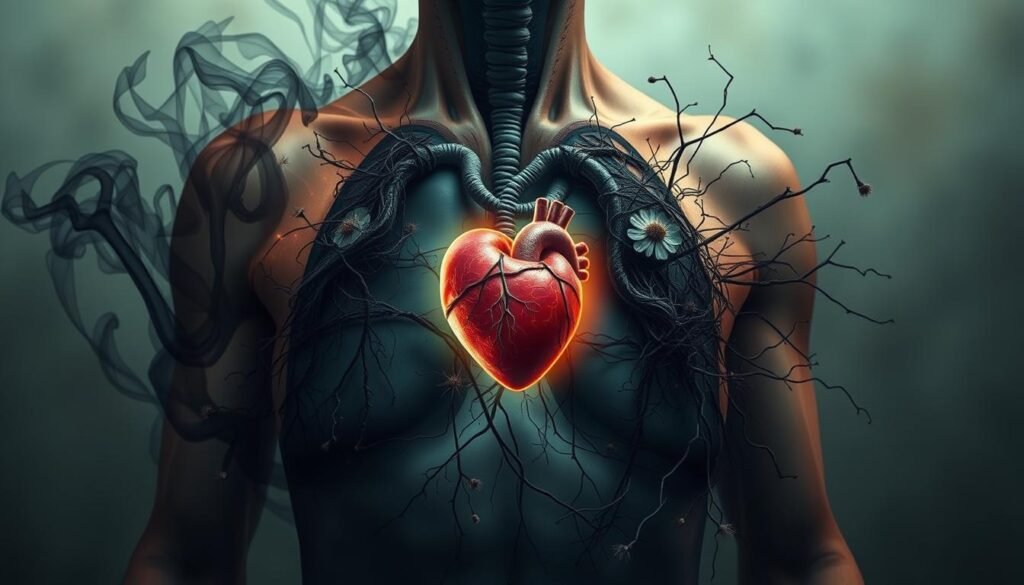As many as 30% to 40% of people going to emergency rooms for chest pain actually suffer from anxiety. This fact highlights how important it is to tell the difference between anxiety and serious heart problems. Those feeling chest pain from anxiety might experience sharp, brief stabs of pain, even when they’re relaxed. Knowing these symptoms is key to getting the right help quickly.
Knowing how anxiety and chest pain are connected can change lives. People with anxiety often worry more because of chest tightness. But recognizing these signs can guide them to effective treatments. Many health insurance plans will even cover these treatments.
It’s crucial to understand how anxiety shows up in the body. Learning about the physical signs of anxiety disorders helps people take the right steps towards care.
Key Takeaways
- Anxiety can account for 30% to 40% of low-risk chest pain cases in emergency rooms.
- Chest pain from anxiety often begins suddenly and can last around 10 minutes.
- Stress responses in the body can lead to symptoms like chest tightness and heart palpitations.
- Relaxation techniques are effective in managing anxiety chest symptoms.
- It’s important to differentiate anxiety chest pain from serious heart conditions for accurate treatment.
- Anxiety disorders affect nearly 1 in 5 adults at some point in their lives.
What is Anxiety-Induced Chest Pain?
Anxiety-induced chest pain is a way our body reacts to intense anxiety. People feel tightness, pressure, or pain in their chest. These feelings are often confused with heart problems. This mistake can make the anxiety worse. About 25 to 50 percent of people who go to the ER for chest pain with low risk are actually experiencing anxiety.
Studies show that 20% to 70% of panic attacks include chest pain. Panic disorder affects 1 to 4 out of 100 people. This shows how often chest pain from anxiety happens. Moreover, 18% to 25% of people at the hospital for chest pain have panic disorder. Anxiety can trigger physical responses that feel like serious health issues.
There are many ways to treat anxiety-related chest pain. Medicines like SSRIs and benzodiazepines can help. Therapies such as cognitive behavioral therapy (CBT) are also effective. Making changes in your lifestyle is key too. This includes exercising, managing stress, getting enough sleep, and eating well. These steps can reduce anxiety chest pain over time.
Understanding Anxiety in Chest
Chest anxiety appears through various physical signs that are often confused with severe health issues. Many feel these discomforts, thinking they are heart problems. Yet, about 58% of chest pains are from anxiety or panic attacks, not heart issues. Understanding the link between our feelings and body reactions helps us grasp chest anxiety causes.
These symptoms often include chest tightness, fast heartbeat, and sometimes nausea. During stressful times, this discomfort can grow, making anxiety worse. Techniques such as deep breathing greatly aid in handling these feelings. Using pursed lip breathing helps control breathing out, easing chest tightness. Box breathing, taking slow breaths in and out, also helps calm the mind and relieve chest anxiety symptoms.

Not sleeping enough and not managing emotions well can make stress worse, leading to more anxiety symptoms. Eating well, staying active, and practicing mindfulness are key in handling anxiety. Writing down feelings helps make sense of them and find what causes chest anxiety. It’s smart to see a mental health expert for advice that fits you.
| Symptom | Description |
|---|---|
| Tightness | Feeling of pressure or constriction in the chest area. |
| Rapid Heartbeat | Increased heart rate often felt during anxious moments. |
| Nausea | A sensation of discomfort in the stomach that may accompany stress. |
| Pain Duration | Chest pain from anxiety typically lasts around ten minutes but can vary widely. |
| Chest Pain Location | Often located in the center or left side of the chest. |
| Accompanying Symptoms | May include tingling or burning sensations in the extremities. |
Common Symptoms of Anxiety Chest Pain
Anxiety chest symptoms can show up in many ways. They make it hard to tell anxiety chest pain from other health issues. We will look at three main symptoms closely.
Sharp and Shooting Pain
Sometimes, you might feel a sudden, sharp pain in your chest. It feels like something is stabbing you. These pains are quick but strong, making you feel more anxious.
It’s easy to think it’s something serious. However, these pains often come from stress or worry.
Persistent Chest Aches
Then, there are aches that don’t go away quickly. They’re dull and can hurt a lot or a little. You might think it’s a heart problem.
But it’s usually anxiety mixing physical and emotional pain. Knowing this helps you handle these aches better.
Chest Tightness and Tension
A common symptom is feeling like your chest is tight or heavy. This often happens when you’re stressed. It leads to fear and more worry.
People might think it’s something worse. Learning that it’s mostly anxiety can help you deal with it more easily.

Distinguishing Anxiety Chest Pain from Heart Attack Symptoms
It’s important to know the difference between chest pain from anxiety and heart attacks. Anxiety chest pain often feels sharp or like shooting pains. It’s linked to panic attacks caused by stress. These episodes usually last from a few minutes to an hour. They tend to go away after the panic attack ends.
Heart attack symptoms, however, tend to last longer. People may feel pain or tightness in their chest, especially on the left side or under the breastbone. This pain feels like pressure or squeezing. It can last for different lengths of time. Heart attacks can also cause nausea, difficulty breathing, jaw pain, and sweating.
Knowing the differences is critical for getting the right help quickly. A comparison of the two can make these differences clear:
| Symptom | Anxiety Chest Pressure | Heart Attack Symptoms |
|---|---|---|
| Nature of Pain | Sharp or shooting | Pressure or squeezing |
| Duration | Minutes to an hour | Persistent or coming in waves |
| Trigger | Emotional stress | Physical exertion |
| Accompanying Symptoms | Feeling of impending doom | Nausea, sweating, jaw or arm pain |
Being aware of the differences between anxiety chest pain and heart attack symptoms is key to health. While they have similar symptoms, knowing what sets them apart helps in making medical decisions. If you have these symptoms for the first time, it’s important to get checked by a doctor.

What Causes Chest Tightness Anxiety?
Chest tightness from anxiety comes from both body and mind factors. It’s key to know these causes. This knowledge helps us understand how anxiety affects our bodies. Stress is a big factor in causing this discomfort.
Stress Response and Hormonal Release
When people feel anxious, their bodies release hormones like adrenaline and cortisol. These chemicals prepare the body to either fight or flee. Because of this, your heart beats faster, and your muscles tighten. This often makes your chest feel tight. About 30% of people might experience anxiety disorders, linking them to chest tightness.
Emotional Triggers and Psychological Responses
Emotional triggers, like past trauma or continuous stress, can worsen chest anxiety. These feelings lead to physical discomfort or even sharp pain. This can start a cycle of anxiety and fear of heart issues. Knowing about these reactions helps us find ways to cope. Sites like anxiety and chest pain insights offer help to lessen these symptoms.
The Fight-or-Flight Response and Chest Pain
The body reacts to danger with the fight-or-flight response. It’s crucial for survival. In stress, the body gets ready to face or escape the threat. This leads to faster heart rate and higher blood pressure, causing chest anxiety causes like pain.
Chest anxiety often feels like sharp, short stabs. These come from tight chest muscles during anxiety. High blood pressure shows how stress affects our hearts and blood vessels.
Using this response too much can make symptoms worse over time. People may feel chest pain often, thinking it’s heart trouble. It’s important to get checked by a doctor. Tests like ECGs can clear up concerns.
To handle anxiety’s impact, try deep breathing and being mindful. These can slow your heartbeat and relax muscles. Working out helps too, improving mood and lowering anxiety.
Knowing how these elements connect helps manage symptoms. Using tools like the GAD-7 scale enables self-observation. Spotting early signs of anxiety lets people act to improve their well-being.
How to Relieve Anxiety in Chest
Anxiety in your chest can feel scary. Learning to ease this feeling is important for comfort. Knowing how to relieve anxiety in chest means trying different ways like deep breathing and focusing on now, which help you relax.
Deep Breathing Techniques
Deep breathing is great for calming your mind and body. It makes your heart slow down and can lower blood pressure, making you feel less anxious. A popular method is:
- Inhaling deeply through the nose for a count of four.
- Holding the breath for a count of four.
- Exhaling slowly through the mouth for a count of six.
Doing deep breathing exercises often can be a key part of handling chest anxiety when stress spikes.
Mindfulness and Visualization Practices
Mindfulness meditation lets you focus on now, not the past or future. Adding visualization, like picturing a calm place, helps even more. Try to think of peaceful scenes to steer clear of anxiety. Doing this often helps you feel better overall, making anxiety in the chest easier to manage.
Anxiety Chest Symptoms: Individual Differences
Anxiety chest symptoms are different for everyone. Each person’s experience is shaped by their past, emotions, and health. Some might feel discomfort near their heart, while others have different signs. It’s important to see that everyone’s anxiety is different.
Experts say it’s crucial to know about the many chest pain anxiety symptoms. Things like genetics, past traumas, and how we live play a role. Mental health issues like panic attacks, PTSD, and OCD can affect the heart. Women often experience these issues more, which changes their body’s reaction.
Anxiety can also cause a fast heartbeat and high blood pressure. This is especially true for people with heart problems. The way chest discomfort feels can get worse because of this. Finding the right treatment for each person is key.
- Understanding individual differences allows for tailored treatment strategies.
- Incorporating both pharmacological and psychotherapeutic therapies can effectively manage chest pain anxiety.
- Consulting resources like PlushCare can provide guidance on tailored care options.
Knowing your emotional triggers and health background helps manage anxiety chest symptoms. Understanding these parts of yourself aids in finding the right treatment. It also boosts overall health. Seeing the variety in how anxiety shows up is crucial for dealing with heart-related anxiety well.
Effective Treatments for Anxiety Chest Discomfort
Dealing with anxiety chest discomfort isn’t easy, but many methods can help. Using Cognitive Behavioral Therapy (CBT) is one successful way. It lets people see and change bad thought habits that lead to chest pain from anxiety. CBT not just helps mentally, but it also teaches how to handle discomfort better.
Medication can be key for those with heavy anxiety. Doctors often suggest SSRIs and benzodiazepines to ease panic and anxiety symptoms. Yet, pills should be part of a bigger plan. Eating well, exercising, and relaxation techniques also play big roles. They help lower the stress that causes chest anxiety, making everyday life easier.
About 40 million Americans deal with anxiety disorders. Knowing about it and getting help is crucial. There are many treatments available that can reduce anxiety chest discomfort. This improves life quality. Looking into professional help and taking care of yourself is essential. It offers a complete way to overcome the issues linked to anxiety-induced chest pain.